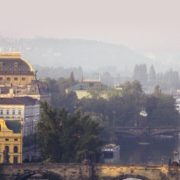Private companies own almost half the total area of Prague, while the city only owns 30%. Deputy Mayor, Petra Kolinska, says that private companies own too much of the city, and this is inhibiting progressive development.
“Prague should buy, not sell,” said Kolinska about its land usage issue.
Privately owned companies are a critical aspect to development, providing business opportunities and funding for public projects. The more money in circulation, the more money there is available for development. However, this is a simple and limited view on public development. While private ownership promotes development, this approach ultimately leads to private entities owning a significant portion of Prague. Significant private ownership limits the city’s ability to develop.
“Land ownership gives the city the possibility to actively develop these areas – the possibility of placing specific public buildings, reserving areas for schools, hospitals, parks or afforestation. Land owned by the city is one of the important prerequisites for the development and construction of the necessary public infrastructure,” according to a press release by the city of Prague.
While being pro-business generates money, minimal funding goes towards public goods, such as schools and hospitals. If the city does not own the land, it’s severely limited in its ability to chose how Prague will look and function in the future. Instead, the choice is left to private businesses, which often do not have the public’s interest in mind.
“Prague owns only a third of the land on its own territory – and a large part of it is a road that can not be built. Thus, they do not possess enough strategic plots to serve for further development. It is a mistake of the 90s when the city sold its land,” said Kolinska.
As Kolinsky said, Prague’s tactic of selling land to private companies gained force in the 1990s. Kolinska’s sentiment mirrors a strong movement within Prague to take back and improve public spaces. The attempt is part of an overall initiative to improve Prague as both a public and green city.
“We have two goals, one is to change how people think about the city, the other is to improve public places, and make Prague a more coherent city for the people that live here,” said Marek Vácha, the spokesman of the Prague Institute of Planning and Development (IPR).
IPR helps set the agenda for Prague’s development, but to do so, they need land that they can develop on. The large portion of land owned by private entities is not the only issue affecting public projects. Public development projects have to go through many, complex processes in order to be approved.
“Prague has seven districts and 2,200 elected officials,” said Vácha, “The process is fragmented, this can make public projects difficult to approve and finalize.”
Vácha acknowledges that this is a part of the bureaucratic process, and many cities face issues like these. While, in the past, Prague has sold its land, now, in many projects, it is looking towards alternative solutions. One approach the city is taking is through lease agreements. These agreements allow the city to gain consistent revenue while maintaining ownership. While this approach keeps land in city ownership, it does not solve the problem.
The battle between public and private ownership is long, complex, and filled with contention. Both have benefits, and both have disadvantages, and the effects largely depend on how they are done. The likely answer is a balance between the two. However, as we can see, the balance in Prague is unevenly swayed towards private entities.
Author: red
Support Prague Morning!
We are proud to provide our readers from around the world with independent, and unbiased news for free.
Our dedicated team supports the local community, foreign residents and visitors of all nationalities through our website, social media and newsletter.
We appreciate that not everyone can afford to pay for our services but if you are able to, we ask you to support Prague Morning by making a contribution – no matter how small 🙂 .




